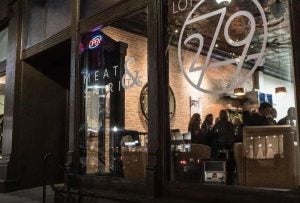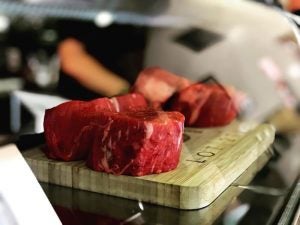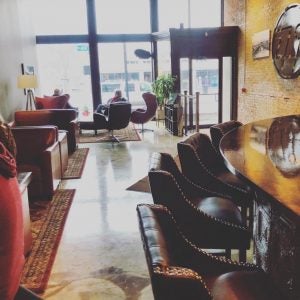A family of cattle producers, butchers, and restauranteurs in Norfolk, Nebraska, didn’t let COVID-19 clip their wings. Instead, they found a way to tap into the power of locality and reach even more consumers amid the heights of the pandemic. To do this, the Albers family added a brand-new curated meat service to their business portfolio — a delivery subscription service known as “Meat Man.”
This has allowed them to expand their roots to the nearby communities of Lincoln and Omaha while, as restrictions lift, still serving customers from their restaurant and butcher shop — Lot 279 — at home in Norfolk.

Instead of having to wait amid the uncertain and turbulent supply chain or until brick-and-mortar dining was reopened, the Albers’ customers were able to get premium beef on demand.
“Our thought process was: Let’s make this easy for the consumer,” says Blake Albers, who notes the family has been in the local beef business since 1928. “And let’s make it so we can have a lower price, or a more value-conscious product, all the time that people can purchase.”
A homegrown solution
A monthly Meat Man membership offers a variety of cuts and grinds shipped directly to the doorstep of local customers in Lincoln and Omaha. Monthly members receive Lot 279’s choice of an assortment meats bundle and free delivery.
Annual access members can place their orders throughout the year on demand with free local delivery over $99. (This membership also includes a pretty awesome 20-quart BigFrig Badlands cooler for ordered meats to be dropped off in.) All members also receive the Albers’ recommendations for preparation, exclusive recipes, and discounts. Local members can even have their orders fulfilled on the same day when made before 11 a.m.
This exemplifies their mission to bring “the taste of Nebraska tradition delivered right to your door.”

And, all of this is done entirely through the Lot 279 website. Albers says their thinking on this enterprise was to be as self-reliant as possible and not need to rely on the hassle of third-party logistics, delivery, or software. Of course, this mode of operation also adds to their profitability.
“You’re not talking about super high margin products,” Albers says. “These are very average everyday markups. If you have two or three failures out of one day’s worth of shipping, that can set back the entire day. So, we wanted to take that delivery process into our hands.”
Something else this does is add to their credibility and feel like a genuine local business with both a brick-and-mortar store and local farm.
Resiliency amid the pandemic
There were a couple of different times in 2020 that COVID made the standard business model get a bit rocky. One was when it became pretty unsustainable to rely on ground shipping to handle nationwide online orders that came in on their website.
“Out of nowhere, the shipping industry went from 95 percent on time to … what, for us, felt like zero,” he explains. “We were having to do so many reships.”
Because this constrained the order-out part of their business (many of these customers are on the coasts), they wanted to explore another way to reach more folks while the doors were still closed. And to do that, they looked local, going to customers they could personally deliver to for surefire timeliness.

So, during the heat of COVID, the Albers quickly set up an ordering and delivery website specifically for customers in the Norfolk, Omaha, and Lincoln areas.
Then, when things began to reopen and shipping again became more reliable, they temporarily re-shifted focus to nationwide customers. But amid 2021’2 year’s ongoing logistical uncertainties, the Albers quickly came to revisit their local idea.
“Early [this] summer … we said, ‘Hey, we had something there, let’s refine that. Let’s figure out something better for the customer and let’s really run with that idea,’ ” Albers explains. “[It’s] basically just taking control of getting that product to the customer. There’s plenty of people in eastern Nebraska. … We have a decent enough size population. If we have quite a few people decide that they want to buy some protein from us, it will be a pretty good success.”
As a result, they revamped their website and homed in on their Meat Man membership offerings. This doesn’t take away from their national audience, and they still offer traditional ground shipping, but this additional move has notably expanded their horizons.
“Long term this decision will put us in a much better position to grow as a company,” Albers says. “We’re doing something that I think that customers seem to like, and we’re doing something that isn’t impacted by a Facebook ad algorithm or a third-party shipper. My growth campaign is going to build a presence in one community. … I think that those [COVID] setbacks forced us into a business model that I like better.”
Jaclyn Krymowski is a graduate of The Ohio State University with a major in animal industries and minor in agriculture communications. She is an enthusiastic “agvocate,” professional freelance writer, and blogs at the-herdbook.com.



